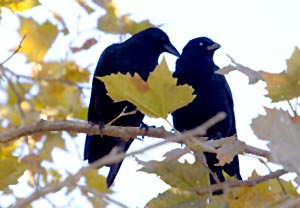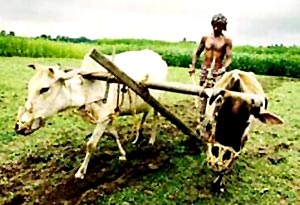Of the many unique customs prevalent among the Hindus, Sakunam or Omen is perhaps one of the most interesting and worthy of notice. In this customs certain days of the week are considered inauspicious for journeys in certain directions. The statement can be elaborated as Mondays and Saturdays are inauspicious for a journey towards the East, while Tuesdays and Wednesdays are inauspicious for a journey towards the North. Fridays and Sundays are considered quite unsuited to start on a journey towards the West, while Thursdays are regarded as undesirable days for undertaking journeys to places in the South.
The cries of certain birds and animals are said to forebode success or failure or even death when heard at the time of discussing a subject or at the beginning of an undertaking. To quote an example the braying of an ass or a donkey is generally considered to be good while the chirping of a lizard is auspicious or inauspicious in accordance with the particular directions on particular days of the week. The hooting of the owl is auspicious or inauspicious according to the number of times the hooting is repeated by the bird.
Certain asterisms are suitable for certain specific purposes while the same will be considered highly inauspicious for certain other purposes. Certain months of the Hindu year are considered highly inauspicious for marriages and occupation of houses, especially houses that are newly built. Some months are said to be highly auspicious for the performance of all auspicious ceremonies.
 The arrival of guests is believed to be foretold by the cawing of a crow in a house while the wailing of a dog in the street or the village is considered to forebode death.
The arrival of guests is believed to be foretold by the cawing of a crow in a house while the wailing of a dog in the street or the village is considered to forebode death.
All the above statements do not come strictly under Omens, which embrace only the sneezing of a man or a woman and the cry of certain birds and animals. The arrival of certain persons and objects in front and the passing across the path of certain birds and animals are also well considered.
The sight of certain animals is said to be auspicious while their cries are inauspicious. It is considered desirable to hear the cries of certain animals but not to see the crying birds. A jackal, for example, can only be seen and not heard while a donkey can only be heard and not seen. Both the sight and the cry are auspicious in the case of certain creatures like the Brahmani-Kite, while both of them are inauspicious if it happened to be the vulture or some such bird.
The passage of certain birds and animals from right to left or from left to right of an individual on his way forebodes good or evil to him or his undertaking, according to the kind of animal or bird crossing the path.
 A maiden, a cow, fruits, flowers, curd, animals like elephants, bulls and horses, Brahmins, grains, gold, sandal-paste, lotus flowers, fried rice, cooked rice, corpses, pearls, a cow with its calf and a mother with her child and certain other things are considered to be desirable and auspicious objects to meet on the way by an individual or individuals proceeding on a journey. The hearing of the sounds of music is also considered to be highly auspicious on all occasions.
A maiden, a cow, fruits, flowers, curd, animals like elephants, bulls and horses, Brahmins, grains, gold, sandal-paste, lotus flowers, fried rice, cooked rice, corpses, pearls, a cow with its calf and a mother with her child and certain other things are considered to be desirable and auspicious objects to meet on the way by an individual or individuals proceeding on a journey. The hearing of the sounds of music is also considered to be highly auspicious on all occasions.
Meeting a deformed man or a man with disheveled or matted hair or with his head anointed with oil, red flowers, wet-cloth, a potter, a pig, a snake, a hare or salt on the way is regarded as inauspicious. In the same way hearing the sound of weeping or lamentations on the way are considered highly inauspicious omens that might jeopardize even the life of the person proceeding on the journey.
Birds like crows, parrots, peacocks, etc., and Brahmani-kite and animals like jackal, tiger and buffalo may cross the path from left to right and it forebodes good. But if they crossed from right to left the same forebodes evil and woe to the person undertaking the journey or failure of the undertaking itself. If animals like cats, snakes and hares cross the path at all, are said to forebode evil and disaster. Meeting a single Brahmin, two Sudras, three Vaisyas, four Kshatriyas, two new pots, widow or widows and the hearing of the grunt of pigs are also considered to be inauspicious. Whereas two Brahmins, one Sudra and a woman having her husband alive are considered to forebode good if they happen to come before the man or woman proceeding on the journey. If the light goes out when a question relating to important subjects is being discussed, it forebodes evil and if there is a drizzle when about to go on journey, it also forebodes evil.
An individual believing in the omens would never proceed on his journey. He or she will cancel it despite of the urgency of his business. And the cancellation will depend on the satisfactory omens. There have been many pre-arranged marriages stopped on account of the unsatisfactory nature of the omen.
It can be understood of the rationale for this time-worn belief. `Faith` and `Belief` are two fundamental expressions of the Hindu religious ideals that have given rise to pithy sayings and humorous anecdotes. `Children and God resort to persons and places where they are made much use of it` is a household saying. This is significant as emphasizing the above statement.
 In a small village there was a poor farmer and he had a scythe made as an offering to Ayyandr i.e. the village guardian deity, to fulfill a certain vow of his. He placed it in front of the deity in the temple and returned home to take his meals. Meanwhile a thief, who was an unbeliever in God, passed that way. Seeing the nice new-scythe, he took possession of it and was going on his way. The deity in a rage is said to have hastened to the farmer, slapped him on the face and told him to hasten after the thief to recover his scythe.
In a small village there was a poor farmer and he had a scythe made as an offering to Ayyandr i.e. the village guardian deity, to fulfill a certain vow of his. He placed it in front of the deity in the temple and returned home to take his meals. Meanwhile a thief, who was an unbeliever in God, passed that way. Seeing the nice new-scythe, he took possession of it and was going on his way. The deity in a rage is said to have hastened to the farmer, slapped him on the face and told him to hasten after the thief to recover his scythe.
When once the `Faith` and the `Belief` are conceded among the masses of the Hindus the rationale regarding omen must appear clear. They believe in omens and their belief is justified by the results as well.
By way of some scientific explanation it might be said that all animals, plants and minerals are under the influence of one planet or another and the intelligences controlling and guiding them are called Devatas i.e. celestials. So it goes without saying that everything in this world is being guided by one or other of those intelligences working together for common good. Human beings by their belief and faith draw the attention of those intelligences. And eventually they show them by bringing about or utilizing chances of men and animals going from one place to another to indicate what is going to happen. These creatures cannot prevent or modify what is going to happen in the least, but they merely show unwittingly that the business will be delayed or the object will be frustrated.
Anyhow the fact remains that the omens prove true at least in the majority of cases and consequently do not deserve to be brushed aside as superstition as some are inclined to do. They deserve to be scrutinized and studied.
No custom would continue to be observed or followed unless it is found to be efficacious in certain things or useful. This custom of observing Sakunam or omen has stood for ages. Further the majority of the Hindus know that there is something inexplicable in this custom. This by its truth fills them with wonder by the wonderful results both good, bad and indifferent according to the nature of the omens themselves.



















